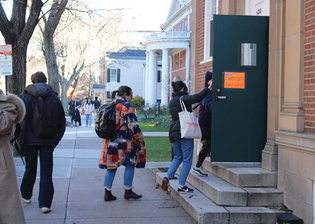
Thomas Breen/New Haven Independent
Union members lined up to vote on a contract in December.
View full image
For anyone who remembers the 37-year history of the effort to organize a union for graduate student workers at Yale, the last year and a half has been nothing short of remarkable. The decades of contention over the issue included strong opposition from the university administration and significant pushback from some graduate students, particularly in the sciences. There was a grade strike in 1995, a failed student referendum in 2003, a hunger strike in 2017, a novel “microunit” strategy by the union that the university disputed, and years of flip-flops from the National Labor Relations Board over whether graduate students who work as teaching assistants and research assistants should be categorized as employees.
But when the organizing group Local 33–UNITE HERE, buoyed by the latest NLRB decision in their favor, won the right to an election in the fall of 2022, the university’s legal and rhetorical response was unusually restrained. And opposition among graduate students was equally quiet. Graduate workers voted 1,860–179 to form a union.
Once the union was a reality, there was potential for conflict again when it came time to negotiate the first contract with the university. Graduate workers at Harvard, after all, had gone on strike for 29 days in 2019 and 3 days in 2021 while trying to hammer out contracts with the university. And 48,000 workers in the University of California system staged a massive six-week strike in 2022 before reaching a new contract agreement.
But at Yale, negotiations went on for nine months with hardly a peep from either the union or university officials. And on December 8, Local 33 and Yale announced that they had reached a tentative agreement on a contract that would run through July 2028. A week later, union members voted 1705–10 to ratify the contract.
In a letter to the Yale community, provost Scott Strobel wrote that the contract “reflects negotiations between Local 33–UNITE HERE and Yale that were conducted with collegiality and respect.” He said the agreement “responds to many Local 33 priorities, acknowledges the important contributions of graduate workers, and upholds our responsibilities as an academic and research institution.”
Local 33 leaders told members that the agreement “raises the industry standard for graduate teachers and researchers.” The minimum salary and stipend for a PhD candidate in the spring of 2024 is now $48,330, a 19.2 percent increase that gives Yale’s graduate workers the highest minimum stipend in the Ivy League.* Graduate workers will get 2.5 percent raises in each of the next four academic years. Among other benefits, the university agreed to offer a dental insurance plan to graduate workers and pay 80 percent of the premium cost for an individual.
Not to be overlooked is a provision that gives the union a modicum of stability in an era when the NLRB’s position on graduate workers has habitually changed with each new presidential administration: Yale agrees to recognize the union through December 2031, regardless of any change under federal law in that period. That, along with a no-lockout/no-strike clause in the contract, means things may stay quiet for the foreseeable future.
_______________________________________________________________
* In our print edition and in an earlier version of this online article, we reported erroneously that the new contract makes Yale's graduate workers the highest-paid in the Ivy League. In fact, at least one other Ivy, Princeton, has a higher maximum stipend.
 loading
loading